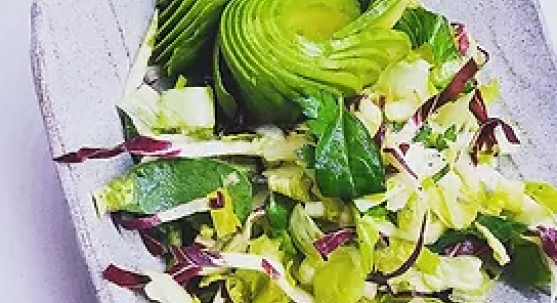
Ayurveda, an ancient system of medicine and life philosophy originating in India, focuses on balancing the body, mind, and spirit for optimal health and well-being. At the heart of Ayurveda is the concept of the three doshas—Vata, Pitta, and Kapha—which are the unique energies that govern our physical and emotional constitution. Ayurvedic cuisine is designed to bring balance to these doshas through the thoughtful combination of ingredients, flavors, and cooking techniques.
Ayurveda, an ancient system of medicine and life philosophy originating in India, focuses on balancing the body, mind, and spirit for optimal health and well-being. At the heart of Ayurveda is the concept of the three doshas—Vata, Pitta, and Kapha—which are the unique energies that govern our physical and emotional constitution. Ayurvedic cuisine is designed to bring balance to these doshas through the thoughtful combination of ingredients, flavors, and cooking techniques.
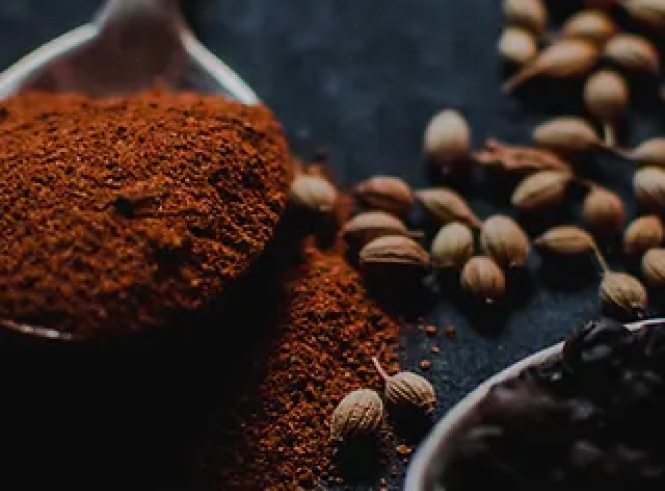
In Ayurveda, food is considered medicine, and the right nutrition plays a crucial role in maintaining balance and promoting health. Ayurvedic nutrition follows a set of principles that emphasize the importance of eating fresh, seasonal, and locally sourced ingredients. By choosing foods that support the individual’s unique dosha and incorporating all six tastes—sweet, sour, salty, bitter, pungent, and astringent—Ayurvedic cuisine can help to nourish the body, mind, and soul.

In Ayurveda, food is considered medicine, and the right nutrition plays a crucial role in maintaining balance and promoting health. Ayurvedic nutrition follows a set of principles that emphasize the importance of eating fresh, seasonal, and locally sourced ingredients. By choosing foods that support the individual’s unique dosha and incorporating all six tastes—sweet, sour, salty, bitter, pungent, and astringent—Ayurvedic cuisine can help to nourish the body, mind, and soul.
Ayurvedic cuisine revolves around the understanding of how different tastes and foods affect the body and the doshas. Each of the six tastes has specific effects on digestion, metabolism, and overall well-being:
Ayurvedic cuisine revolves around the understanding of how different tastes and foods affect the body and the doshas. Each of the six tastes has specific effects on digestion, metabolism, and overall well-being:

In Ayurveda, understanding your unique dosha is essential to choosing the right foods and flavors that will support your overall health and well-being. Here is a brief overview of the dietary recommendations for each dosha:

In Ayurveda, understanding your unique dosha is essential to choosing the right foods and flavors that will support your overall health and well-being. Here is a brief overview of the dietary recommendations for each dosha:
By following the principles of Ayurvedic nutrition and choosing foods that support your unique dosha, you can experience numerous health benefits, such as improved digestion, increased energy, better sleep, and a stronger immune system. Moreover, Ayurvedic cuisine fosters mindfulness and awareness of the body’s needs, helping you make conscious food choices that promote balance and well-being.
By following the principles of Ayurvedic nutrition and choosing foods that support your unique dosha, you can experience numerous health benefits, such as improved digestion, increased energy, better sleep, and a stronger immune system. Moreover, Ayurvedic cuisine fosters mindfulness and awareness of the body’s needs, helping you make conscious food choices that promote balance and well-being.
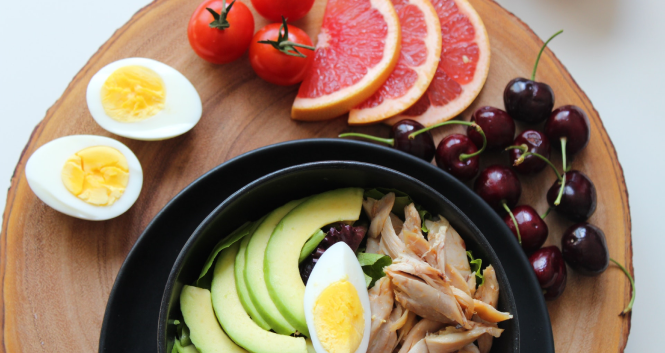

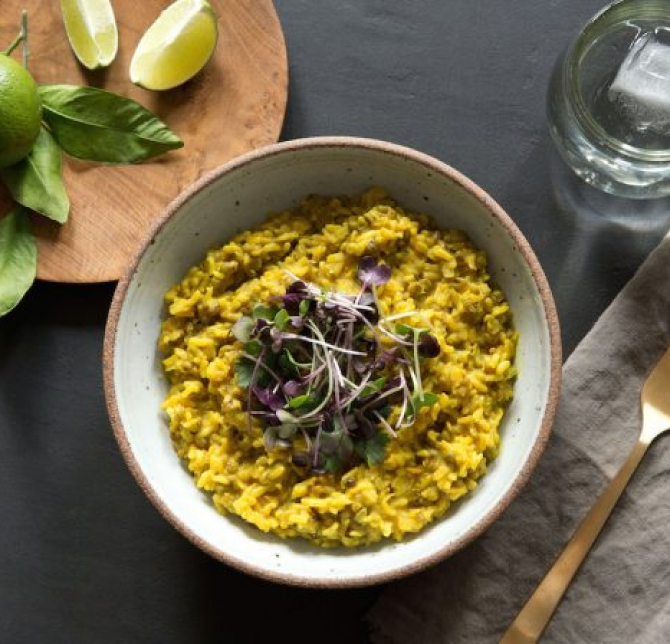
Recipe Name: Kitchari
Brief Description: A traditional Ayurvedic dish made from mung beans and basmati rice, gently spiced and nourishing to support digestion and detoxification.
Ingredients: Basmati rice, split mung beans, ghee or coconut oil, cumin seeds, coriander seeds, fennel seeds, turmeric, ginger, vegetables (such as carrots, zucchini, or spinach), water, salt, and cilantro for garnish.
Instructions: Rinse and soak rice and mung beans, heat ghee or oil in a pot, add spices and cook until fragrant, add rice and beans, vegetables, water, and salt, bring to a boil, reduce heat, and simmer until tender, garnish with cilantro.
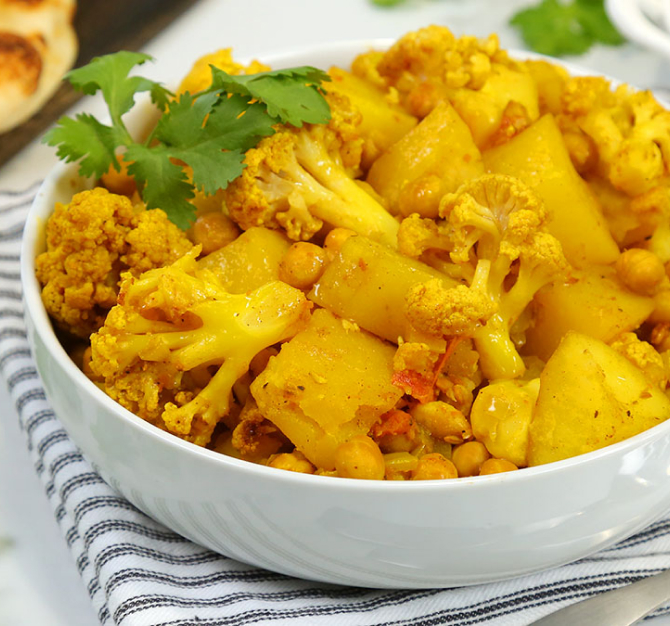
Recipe Name: Aloo Gobi
Brief Description: A flavorful and satisfying dish of spiced cauliflower and potatoes, perfect for a nourishing and balanced Ayurvedic meal.
Ingredients: Ghee or coconut oil, cumin seeds, mustard seeds, turmeric, ground coriander, ground cumin, ginger, cauliflower, potatoes, tomatoes, salt, and fresh cilantro for garnish.
Instructions: Heat ghee or oil in a pan, add cumin and mustard seeds, cook until they pop, add turmeric, coriander, cumin, and ginger, stir to combine, add cauliflower, potatoes, and tomatoes, cover and cook until vegetables are tender, season with salt, garnish with cilantro.
Recipe Name: Aloo Gobi
Brief Description: A flavorful and satisfying dish of spiced cauliflower and potatoes, perfect for a nourishing and balanced Ayurvedic meal.
Ingredients: Ghee or coconut oil, cumin seeds, mustard seeds, turmeric, ground coriander, ground cumin, ginger, cauliflower, potatoes, tomatoes, salt, and fresh cilantro for garnish.
Instructions: Heat ghee or oil in a pan, add cumin and mustard seeds, cook until they pop, add turmeric, coriander, cumin, and ginger, stir to combine, add cauliflower, potatoes, and tomatoes, cover and cook until vegetables are tender, season with salt, garnish with cilantro.


Recipe Name: Ayurvedic Golden Milk
Brief Description: A soothing and healing drink made with turmeric, ginger, and spices, perfect for sipping before bedtime to support relaxation and digestion.
Ingredients: Milk (dairy or plant-based), turmeric, ginger, black pepper, cinnamon, cardamom, nutmeg, and optional sweetener (such as raw honey or maple syrup).
Instructions: Heat milk in a saucepan, add spices, whisk to combine, simmer for a few minutes, strain into a cup, and sweeten if desired.
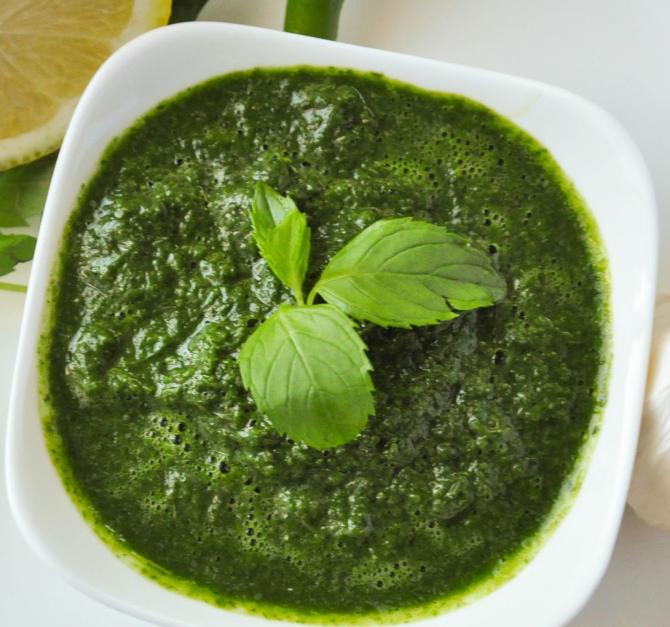
Recipe Name: Coconut Chutney
Brief Description: A refreshing, versatile condiment that balances the six tastes and pairs well with a variety of Ayurvedic dishes.
Ingredients: Fresh coconut, roasted gram, green chilies, ginger, cilantro, tamarind paste, salt, water, and a tempering of mustard seeds, curry leaves, and dried red chilies.
Instructions: Blend fresh coconut, roasted gram, green chilies, ginger, cilantro, tamarind paste, salt, and water until smooth, transfer to a bowl, heat oil in a small pan, add mustard seeds, curry leaves, and dried red chilies, cook until fragrant and seeds pop, pour the tempering over the chutney, and mix well.
Recipe Name: Coconut Chutney
Brief Description: A refreshing, versatile condiment that balances the six tastes and pairs well with a variety of Ayurvedic dishes.
Ingredients: Fresh coconut, roasted gram, green chilies, ginger, cilantro, tamarind paste, salt, water, and a tempering of mustard seeds, curry leaves, and dried red chilies.
Instructions: Blend fresh coconut, roasted gram, green chilies, ginger, cilantro, tamarind paste, salt, and water until smooth, transfer to a bowl, heat oil in a small pan, add mustard seeds, curry leaves, and dried red chilies, cook until fragrant and seeds pop, pour the tempering over the chutney, and mix well.

Explore the world of Ayurveda Cuisine and discover how these ancient principles can support your health and well-being. Dive deeper into Ayurvedic cooking with our comprehensive collection of recipes and articles, and join our community of like-minded individuals on a journey to balance and harmony.
Explore the world of Ayurveda Cuisine and discover how these ancient principles can support your health and well-being. Dive deeper into Ayurvedic cooking with our comprehensive collection of recipes and articles, and join our community of like-minded individuals on a journey to balance and harmony.
